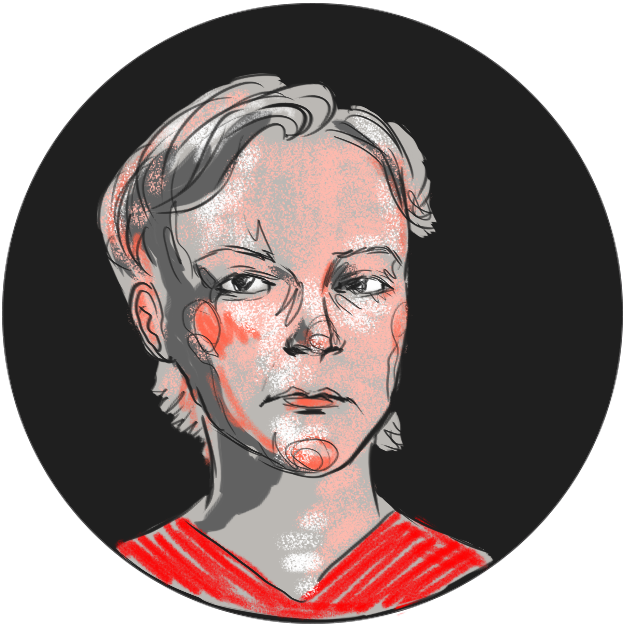“You’ve got my daughter in the police van,” cried Zhanna L. as she was approaching the riot police officer while his subordinates continued grabbing people in the schoolyard, outside the polling station near Zhanna’s house. “You have my daughter. Take me as well.”
What was she hoping for? That seeing the selflessness of a mother would make the riot policeman feel some amount of shame? That he would release her daughter and all of the other people detained for absolutely no reason? Nothing of the sort happened. Zhanna asked to be arrested — and the riot police happily obliged. She hadn't been counting on his mercy anyways. She wanted exactly what she asked the policeman to do — to share the fate of her daughter. And now Zhanna cannot really explain why she felt that need to share in it.
From that police van Zhanna watched as the riot policemen grabbed and beat her husband, who simply went outside to walk the dog. According to Zhanna's logic, she should have asked the officer to arrest her together with her husband as well. So that she could share his fate too. But you can't be arrested twice.
But what about the dog? The little chihuahua was running around the yard looking completely lost, left without its owners, whining and dragging its leash behind itself. At the very least, why don't the police think about the dogs? Dogs are definitely not enemies of the ruling regime. (Don't worry, the dog was picked up and brought home by kind people. Why were you so worried about the dog?)
In prison on Okrestina Street, in cell #18, Zhanna quickly realized that she had overestimated her strength. She wanted to share the fate of her daughter, but her daughter is a young, healthy, and strong woman. Zhanna on the hand has diabetes. A few hours later, Zhanna was already shaking from the surging blood sugar, but was denied any medicine. Zhanna was trembling, but she did not regret asking to get arrested with her daughter.

The logic of self-sacrifice is as follows. The old, hardened political regime is afraid of young people. Afraid of their very youth, their freedom to surf the Internet and unite in ways never before seen in the last century. It is afraid of their desire for change, of their annoying delusion that being born human endows them with certain unalienable rights. The regime detains them, tortures them, intimidates them in the hope that their bodies are stronger than their souls. Souls will break, but bodies will endure, and the terror unleashed won’t look like a clear crime against humanity.
So, come on, take us! Take the old who have hardened souls and weak bodies. Our bodies will definitely break before our souls, and terror will look like what it is — a crime.
This seems to be Zhanna's logic, but Zhanna does not define it that way. She says: “We will protest, but we will not assault the assaulter. We will go out to protests with flowers, cakes, but not with weapons - no, never." No cruelty in the fight against cruelty - that seems to be Zhanna’s slogan, but she does not define it that way.
At the trial, Zhanna was one of the few who was asked if she wanted to formally petition the court. Zhanna simply stated: feed me, give me my diabetes medicine, and provide the bare necessities normally present in the prison cell. She didn’t ask to immediately be released from an unlawful arrest with no legal basis. Not to apologize for lying in the police reports. Not to indict a single riot policeman for perjury, who, according to the paperwork, arrested Zhanna (and ten more women at the same time in different parts of the city), but in fact, had never seen Zhanna before. Not to pay her compensation for an arbitrary arrest. But when you’ve already thrown me into a cell, then at least maintain your dungeon in accordance with your own rules. What is this, if not pathological obedience?

Either out of rudimentary respect for age, or by a sheer coincidence, Zhanna was sentenced not to several days of detention, but to a fine. This did not affect her fate in any way - she was still not released in the courtroom, but taken back to the cell. But when the prisoners of cell #18 were transferred from the prison on Okrestina Street to the Zhodino prison, they decided to release Zhanna with a three-day delay. She stood in the prison corridor, waiting to be released, but still, in the end, they beat her and began to strangle her. "Pathological obedience" is also perceived by the servants of the regime as a protest and is subject to punishment.
Because it is a sacrifice. Because a person like Janusz Korczak or Jesus Christ, sacrificing himself is unbearable for tyranny, even when dead. Zhanna does not define it that way, but acts in accordance with that sentiment.
When Zhanna was released from prison, the volunteers stationed at the gates who were ready to feed the released prisoners immediately, dress them, and take them home, strongly advised her to drive through the city center. Zhanna rode, looked, and felt pride for her people. She saw women in white waving flowers. Dozens, hundreds, thousands of defenseless women. These women protested, selflessly subjecting themselves to arrests, beatings, and insults.
They made a sacrifice. They sacrificed themselves. The law enforcement agencies, of course, considered that self-sacrifice to be feminine nonsense, hysterical female foolishness. People who only understand force, only believe in force and only use force, of course, could not admit even for a minute that female self-sacrifice would ever win.
And it didn't win. Because a person who sacrifices themselves is not going to win. They’re going to sacrifice themselves. It is those who are inspired by that sacrifice who lead the way to victory.



